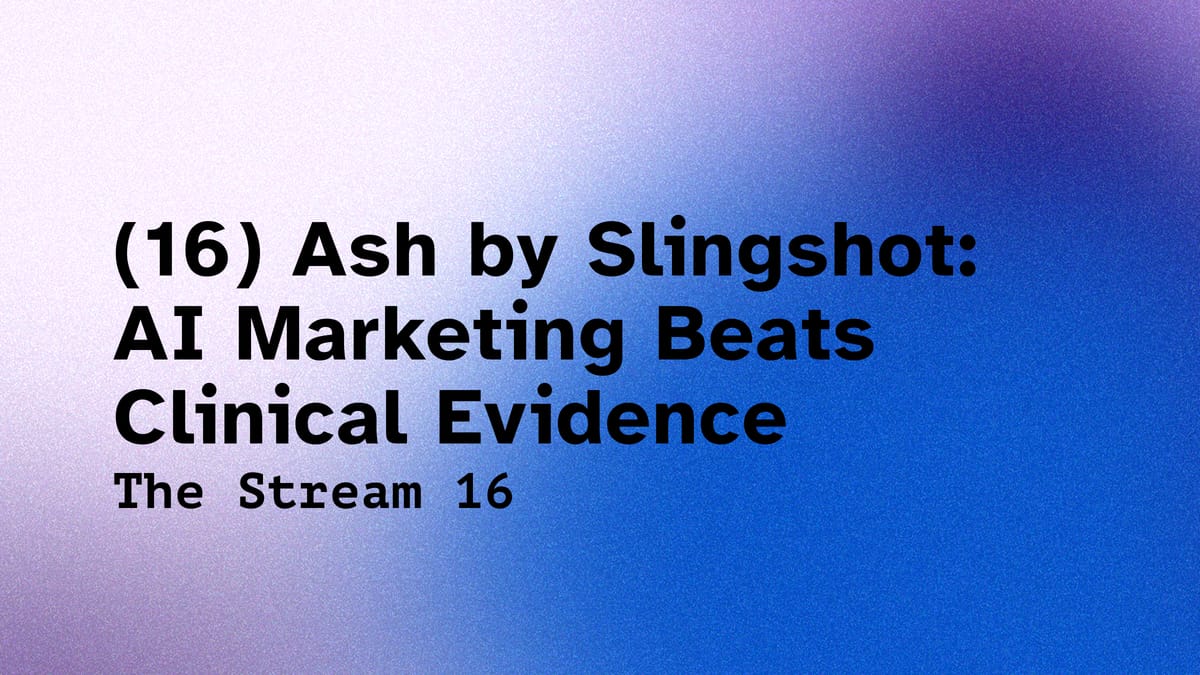(16) Ash by Slingshot: AI Marketing Beats Clinical Evidence

Warning: This edition doesn't really contain a lot of good news :(
I. LLMs are not warning about not being doctors anymore (Article)
Model providers seem to be putting more responsibility in the users' hands when it comes to professional advice from LLMs. On the first versions of ChatGPT, you could expect an immediate reminder that ChatGPT isn't a doctor. But since last year, this guardrail has been taken off almost completely. Almost all major modern LLMs will confidently (try to) diagnose you. This is especially concerning in light of headlines claiming AI to be better than human doctors.
A sliver of hope: LLMs gave most disclaimers when asked questions on mental health, relative to drug interactions, lab results analysis and medical topics.
If you dive into the paper, the claim from the MIT article sounds almost misleading. The distributions are very uneven with most models not giving any disclaimers at all:

For other question types, the distributions were more even, which is reflected in the averages:

Both charts are taken from Figure 2 of the pre-print.
II. Foundation Models for predicting Alzheimer's (Announcement)
Prima Mente, an AI neuroscience research lab, has introduced the Pleiades series of biological foundation models, that attempt to model the epigenetics of brain development.
Their goals are to understand the brain, and enable a new understanding of the degenerative diseases that destruct it. Functionally, the models predict DNA methylation. This might make early detection of Alzheimer's or Parkinson's possible. Early testing provides a proof of concept:
In our studies, Pleiades 7B matched the performance of leading protein biomarkers for Alzheimer's detection, and reached an AuROC of 0.97 when combined with pTau-217. It also performed strongly for detection of Parkinson's, achieving 0.84 AuROC. This provides proof-of-concept evidence for the use of liquid biopsy for the brain. In future, this may enable earlier diagnosis, improved patient outcomes, and targeted clinical trials on specific subsets of individuals with disease.
Read the full pre-print on bioRXiv.
III. Slingshot AI launches Ash – AI for therapy (Product)
Claiming you have a psychological foundation model is enough to make the whole of LinkedIn believe that this is the best product of all time. Ash is marketed as an AI for therapy and is a (currently) free application. Throughout every outlet, it is uncritically called therapy bot. Third parties are completely uncritically picking up the official messaging. The not-so-implicit message in question: Ash is an AI therapist. Beyond that initial tagline, the claims soften up quickly, though:
"It doesn’t offer advice or try to diagnose, but is instead designed to guide users more through self-reflection, similar to how a therapist might prompt deeper thinking."
This quote from a Forbes article about the announcement shows what you are really getting.
Sounds great, but Slingshot is claiming something else in their marketing:

It seems like they haven't quite made their mind about where they want to go. I think that this quote from the same article summarizes most realistically what Ash is really supposed to (and able to) do today:
In the meantime, Parikh says he isn't trying to reinvent therapy, but hoping Ash might just help more people start it.
Maybe this barrage of varying claims is best explained by the fact that there is not much more than claims currently. The company is internally assessing the usability of Ash, though this finding from their about section on the website is even more unspecific than the above claim:
We were also happy to see that early results from an internal study have shown that our users developed stronger real-world relationships after using Ash.
When launching any mental health product, promoting efficacy is an obvious marketing lever to pull. If that is the strongest claim they were able to produce, I would be highly suspicious of the effectiveness of Ash. Ash has been tested with 50,000 users over the last few months already.
Taking a step back, the company also announced new funding with the product launch. It has a total of 93Million USD in funding now, good luck to anyone else competing with that.
Funnily enough, this only makes Ash the second best funded AI therapy bot. Woebot raised 123$M for their D2C-solution but needed to pivot the model to B2B employer solutions earlier this year because the business model was not viable.
The service is currently free, but the company plans to introduce a subscription model for somewhere around 20$/
Full press announcement here: https://www.talktoash.com/posts/introducing-ash
One last thing:
Here is pretty much the only critical take I found this whole past week on Ash: https://www.linkedin.com/posts/malliaris_tech-bros-and-corporate-bros-raising-and-activity-7354450921738665984--gLU?utm_source=share&utm_medium=member_desktop&rcm=ACoAADhbAtgBeMiOdJYFTnNWFW46330zsAYbrQ8
Alright, that's it for the week!
Best
Friederich
Get the weekly newsletter for professionals in mental health tech. Sign up for free 👇

